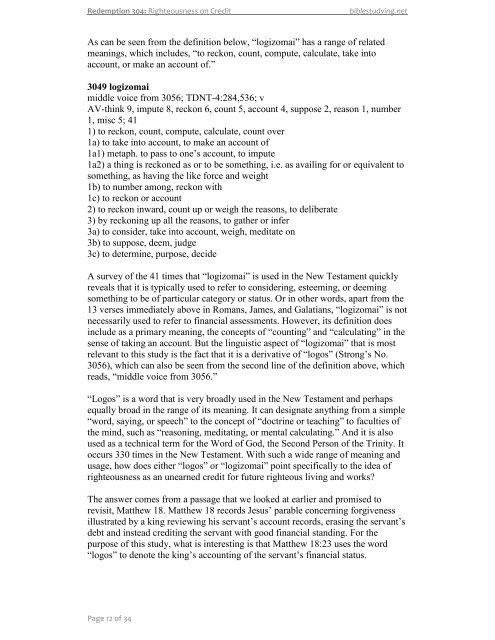righteousness-credit
righteousness-credit
righteousness-credit
Create successful ePaper yourself
Turn your PDF publications into a flip-book with our unique Google optimized e-Paper software.
Redemption 304: Righteousness on Credit<br />
biblestudying.net<br />
As can be seen from the definition below, “logizomai” has a range of related<br />
meanings, which includes, “to reckon, count, compute, calculate, take into<br />
account, or make an account of.”<br />
3049 logizomai<br />
middle voice from 3056; TDNT-4:284,536; v<br />
AV-think 9, impute 8, reckon 6, count 5, account 4, suppose 2, reason 1, number<br />
1, misc 5; 41<br />
1) to reckon, count, compute, calculate, count over<br />
1a) to take into account, to make an account of<br />
1a1) metaph. to pass to one’s account, to impute<br />
1a2) a thing is reckoned as or to be something, i.e. as availing for or equivalent to<br />
something, as having the like force and weight<br />
1b) to number among, reckon with<br />
1c) to reckon or account<br />
2) to reckon inward, count up or weigh the reasons, to deliberate<br />
3) by reckoning up all the reasons, to gather or infer<br />
3a) to consider, take into account, weigh, meditate on<br />
3b) to suppose, deem, judge<br />
3c) to determine, purpose, decide<br />
A survey of the 41 times that “logizomai” is used in the New Testament quickly<br />
reveals that it is typically used to refer to considering, esteeming, or deeming<br />
something to be of particular category or status. Or in other words, apart from the<br />
13 verses immediately above in Romans, James, and Galatians, “logizomai” is not<br />
necessarily used to refer to financial assessments. However, its definition does<br />
include as a primary meaning, the concepts of “counting” and “calculating” in the<br />
sense of taking an account. But the linguistic aspect of “logizomai” that is most<br />
relevant to this study is the fact that it is a derivative of “logos” (Strong’s No.<br />
3056), which can also be seen from the second line of the definition above, which<br />
reads, “middle voice from 3056.”<br />
“Logos” is a word that is very broadly used in the New Testament and perhaps<br />
equally broad in the range of its meaning. It can designate anything from a simple<br />
“word, saying, or speech” to the concept of “doctrine or teaching” to faculties of<br />
the mind, such as “reasoning, meditating, or mental calculating.” And it is also<br />
used as a technical term for the Word of God, the Second Person of the Trinity. It<br />
occurs 330 times in the New Testament. With such a wide range of meaning and<br />
usage, how does either “logos” or “logizomai” point specifically to the idea of<br />
<strong>righteousness</strong> as an unearned <strong>credit</strong> for future righteous living and works?<br />
The answer comes from a passage that we looked at earlier and promised to<br />
revisit, Matthew 18. Matthew 18 records Jesus’ parable concerning forgiveness<br />
illustrated by a king reviewing his servant’s account records, erasing the servant’s<br />
debt and instead <strong>credit</strong>ing the servant with good financial standing. For the<br />
purpose of this study, what is interesting is that Matthew 18:23 uses the word<br />
“logos” to denote the king’s accounting of the servant’s financial status.<br />
Page 12 of 34


